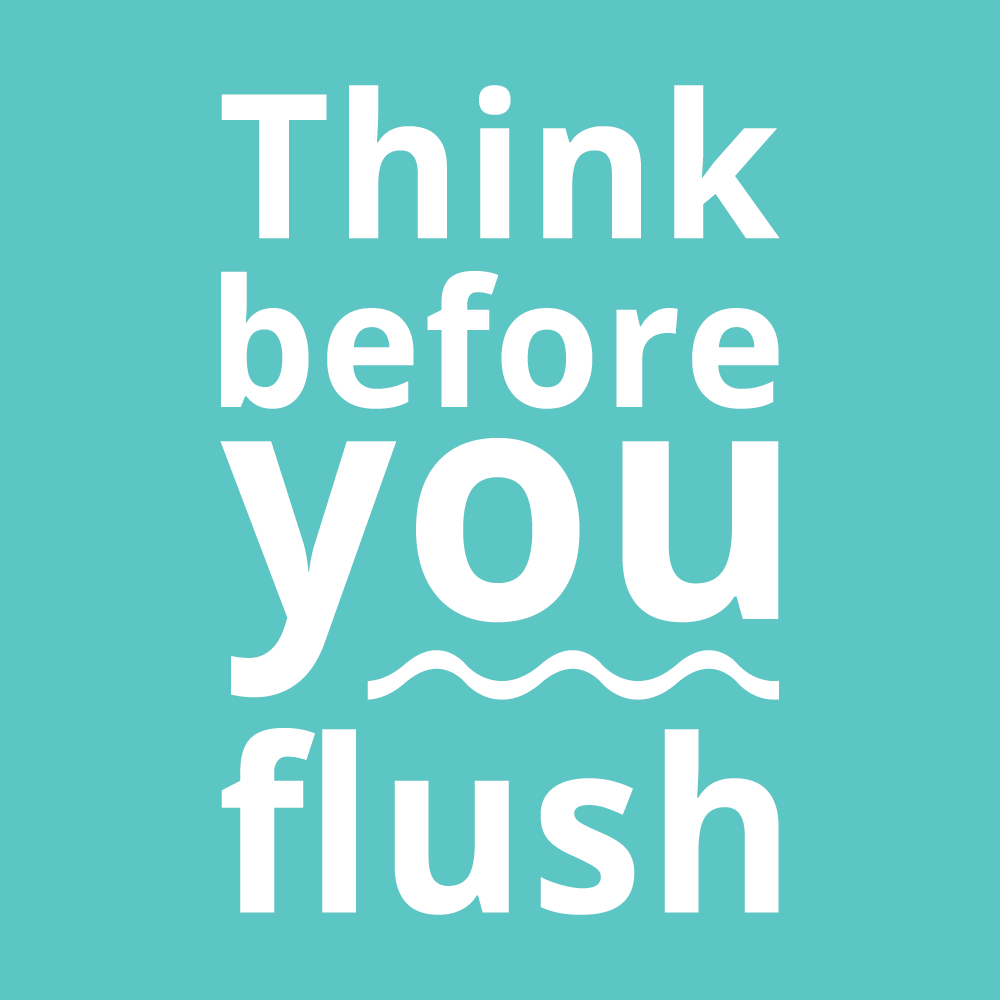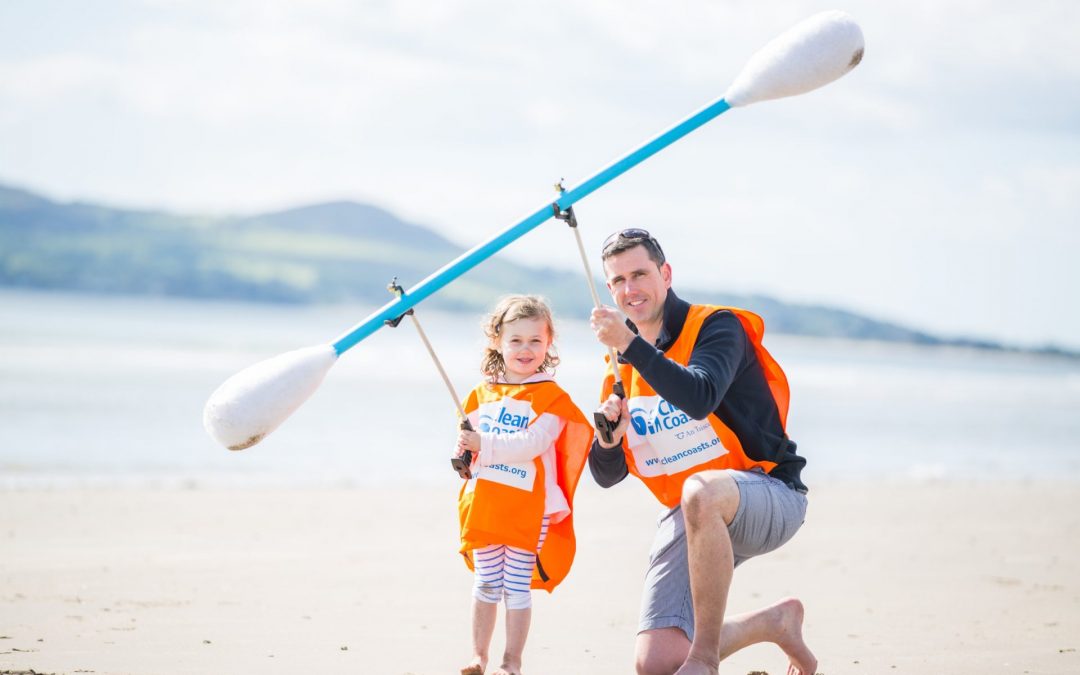Year 2 of the ‘Think Before You Flush’ Communities marks the introduction of 9 new community initiatives. Is your community on the list?
Today, 25th January, Clean Coasts partnered with Irish Water, for the second year running, launch the ‘Think Before You Flush’ Community Initiative. This programme aims to tackle the problems sanitary products can cause our waste water network and marine environment if flushed down the toilet.
As part of the Initiative, educational workshops for schools and businesses as well as community information events will be held to raise awareness of sewage related littering and change poor flushing behaviour.
In 2015, the ‘Think Before You Flush’ campaign focused on a community initiative in Galway City. Due to its great success this year 8 more communities from across the country are now actively involved. These communities will work with Clean Coasts and Irish Water to increase awareness of sewage related litter.
The ‘Think Before You Flush’ Communities for 2017 are:
1. Galway City
2. Balbriggan, Dublin
3. Ballycotton, Cork
4. Birr, Offaly
5. Wexford Town, Wexford
6. Dingle, Kerry
7. Bettystown, Meath
8. Virginia, Cavan
9. Tramore, Waterford
Sanitary items such as cotton bud sticks, face/baby wipes and those items we term as our ‘Dirty Dozen’ should not be flushed down the toilet, entering our waste water treatment network, which is unable to deal with this type of waste. In a study of over 1000 Irish people, a shocking 3 in 10 admitted to flushing such items down the toilet. Of these, 58% admitted to flushing baby wipes down the toilet, 40% facial wipes, 26% cotton bud sticks, 24% tampons and 21% cigarette butts. More than half of those who flush these items down the toilet did so simply due to a lack of knowledge. Sewage related litter is one of the largest categories of litter found on our beaches and is considered to be the most offensive.
90% of those surveyed agreed that seeing sewage related litter during a visit to the beach would disgust them while 84% of those surveyed agreed that if they knew that the items flushed down the toilet could end up being discharged into the ocean and could pollute our coastline and cause potential health risks they would not dispose of items in this way. This type of marine litter is totally preventable by simply changing our flushing behaviour.
Speaking about the expansion of the Think Before You Flush initiative to 9 Communities Sinead McCoy, Coastal Communities Manager, An Taisce said, “The Think Before You Flush campaign increases education and awareness about sewage related litter, enabling people to realise the consequence of their simple bathroom routine, and preventing items like cotton bud sticks washing up on Ireland’s spectacular beaches.”
Grainne Carey, Regional Information Specialist, Irish Water said, “By making small changes in our flushing behaviour we can prevent the harm caused by sewage related litter in the marine environment. Irish Water is investing significantly in improvements to wastewater infrastructure across the country and by partnering with Clean Coasts and local communities around the country we aim to develop an holistic approach to ensure our beaches and other receiving waters, are safe and protected.’’
For more information about Think Before You Flush please visit www.thinkbeforeyouflush.org
An animation showing the impact of sewage related litter is also available on the Clean Coasts YouTube channel: http://youtu.be/8uzdo-8foRs and on www.thinkbeforeyouflush.org
Ends///
Marine Litter
Marine Litter includes a range of materials which have been deliberately discarded, or accidentally lost on shore or at sea. It includes materials that are carried out to sea from land, rivers, drainage, sewage systems and even by the wind.
Sewage Related Litter
Sewage Related Litter is made up of sanitary products and other items that are flushed down public and private toilets and end up littering inland and coastal waterways. Such litter typically consists of cotton bud sticks, sanitary towels, backing strips, tampons, plastic tampon applicators, cotton wool, condoms, cigarette stubs, facial cleansing wipes, baby wipes and toilet fresheners. Less common items include nappies, plasters, medicines and toilet roll tubes.
Sewage related litter enters the sewer system but this system is not designed to process them. Smaller items that are flushed, such as cotton buds, can escape through wastewater filters at the treatment plant and reach our rivers and beaches. Many other dangerous and unsuitable items are also incorrectly disposed of through the toilet into the sewage system, such as razor blades, healthcare waste and medicine. This can end up on our waterways and beaches.
Summary of Our Nation’s Flushing Behaviour Survey
Clean Coasts commissioned a survey of the nation’s flushing behaviour. We wanted to find out; Who disposes of waste in this manner?; What Sewage Related Litter) items do they dispose of?; Why do people flush items down the toilet?; What can be done to encourage a change in behaviour?
We wanted to understand the nation’s flushing behaviour and to do this we used the following metrics:
- Incidence levels within the Irish population of sewage-related littering;
- Reasons for littering in this way;
- Awareness of the implications of disposing of litter in this manner;
- Attitudes towards sewage-related littering
Who was surveyed?
1,033 adults aged 18+ were interviewed. Quotas were set and final data weighted to known national profiles of adults aged 18+ on age, gender, class and region to ensure that the sample is representative of the total Irish population.
What did we find out?
- 3 in 10 Irish adults have flushed items other than toilet paper down the toilet. This figure is higher among those under 35.
- Lack of knowledge is the primary reason for sewage-related littering among those who do so. The destructive nature of such behaviour is not common knowledge. 52% of sewage relating littering is a consequence of lack of knowledge.
- 40% thought it was ok to do so
- 33% did so for convenience
- 26% said it was only a small item
- 20% said there was no bin available
- 18% said it was too messy to dispose of in an alternative way
- 15% said it was out of habit
- 1 in 4 believe these items are chemically broken down
- 1 in 2 thinking they just disintegrate following flushing.
- The top items incorrectly disposed of are:
- Baby wipes 58%
- Facial wipes 40%
- Cotton buds 26%
- Tampons 24%
- Cigarette butts 21%
- Plasters 18%
- Condoms 18%
- Food 15%
- Medicines 12%
- Sanitary pads 6%
- Tampon applicators 5%
- Toilet roll tube 4%
- Nappies 2%
- Cotton wool 1%
- Dental floss 1%
- 6 in 10 stated that they have flushed baby products down the toilet, with baby wipes being the number one item cited by all adults – this figure is slightly higher among women.
- Female hygiene products are only mentioned by 3 in 10 of our total sample rising to over 1 in 2 for females only.
- Males on the other hand over-index on disposing of cotton buds, cigarettes, plasters and condoms.
What are people’s attitudes to sewage related littering?
- 90% agreed – “Seeing sewage related litter during a visit to the beach in Ireland would disgust me”
- 90% agreed – “We need more education about where items other than toilet paper which are flushed down the toilet end up to make sure that less people dispose of waste in this way”
- 84% agreed – “If I knew that the items flushed down the toilet could end up being discharged in to the ocean and could pollute our coastline and cause potential health risks I would not dispose of items in this way”
- 78% agreed – “Flushing items other than toilet paper down the toilet damages our environment”
- 12% agreed – “Flushing items other than toilet paper down the toilet is acceptable”
When it comes to encouraging people not to engage in sewage-related littering, 1 in 4 of the total sample suggest demonstrating the consequences of such behaviour is the way to go, with 1 in 3 who have done so endorsing this option.
Clean Coasts
Clean Coasts Ireland is owned and operated by the Environmental Education Unit of An Taisce – the National Trust for Ireland. It is funded by the Department of the Environment, Community & Local Government, Coca-Cola and Fáilte Ireland. It has been operating in Ireland for 13 years and engages +500 Clean Coasts groups and thousands of beach users. The Green Coast award is also part of the Clean Coasts programme and is an award for beaches that have excellent water quality but may not have the necessary built infrastructure to be eligible for the Blue Flag award. www.cleancoasts.org
Irish Water
Irish Water (www.water.ie) is the national water utility responsible for providing and developing water services throughout Ireland. Incorporated in July 2013 as a semi-state company under the Water Services Act 2013, Irish Water is bringing the water and waste water services of 31 Local Authorities together under one national service provider. The purpose of Irish Water is to safeguard water as a precious natural resource and to deliver water services in a way that protects the environment and meets the needs of all citizens and industry now and in the future.
Irish Water is accountable to two regulatory bodies – the Commission for Energy Regulation (CER) which is the economic regulator for the water industry, and the Environmental Protection Agency (EPA) which is the environmental regulator.
Irish Water is a registered subsidiary company of Ervia (www.ervia.ie)

